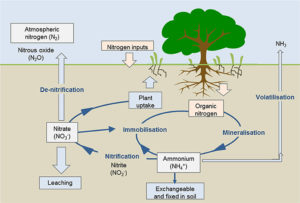 Too Much Nitrogen in Plumeria
Too Much Nitrogen in Plumeria
The Effects of Too Much Nitrogen when you have too much nitrogen in the soil, your plumeria may look lush and green, but their ability to fruit and flower will be greatly reduced.
Nitrogen is a key player in producing chlorophyll; this pigment absorbs sunlight for basic photosynthesis needs. Gardeners must make sure that nitrogen, one of the three macro-nutrients in soil, is available for root uptake by choosing the right fertilizer. Saturating a garden with high nitrogen levels, however, does not improve plant growth. In fact, it can actually harm a garden more than leaving it to its natural elemental state. Too much nitrogen in plants is apparent both above and below the topsoil.
Excess Foliage Growth
One of the main actions of nitrogen is increasing chlorophyll production; this process is done by creating bigger leaf structures with larger surface areas for the photosynthesizing pigment. Excess nitrogen fuels fast foliage growth so that your garden has an appearance of a jungle gone wild, but other plant growth suffers as a consequence. Energy for flower growth is redirected to foliage proliferation, so plants may not even produce their necessary reproductive organs during the growing season.
Burning and Salt Concentration
If you use a high-nitrogen fertilizer mixture, you also increase the soil’s mineral salts; excessive elemental nitrogen takes water away from the plant while leaving the salts behind. As a result, the leaves take on a burnt look from dehydration. Leaf edges become yellow or brown and wilt. Flushing the area with water to remove the excess nitrogen is the best course of action to revive the plant. Although the nitrogen produces desired large foliage, you may find that the rapid growth becomes decimated with leaf burn if nitrogen stays at high levels.
Root Growth Stunting
Energy used for large leaf growth stifles the root system below with high nitrogen soil levels. Roots slow their naturally spreading habit since they do not have the necessary nutrients to use as energy as the elements are redirected upward. As a result, the plant may be destabilized in its soil position; if it is tall enough, it may blow over in heavy winds. Additionally, stressed roots invite disease through soil pathogens as well. In the end, both leaves and roots succumb to nitrogen-induced stresses that damage the plant throughout its length.
Groundwater Pollution
Plants cannot absorb all the excess nitrogen in the soil. Those extra nitrogen levels slowly leach out of the soil through water runoff; the nitrogen is effectively in the form of nitrates due to microbial conversion when it leaches from the soil. As a result, groundwater and drinking water becomes contaminated from the nitrate levels. Between harming the plants and the surrounding water supplies, high nitrogen levels around plants need to be closely monitored and amended for natural harmony.
Removing Excess Nitrogen in Soil
Using mulch for removing excess nitrogen in the soil. Many people use mulch in their garden and have problems with the mulch depleting the nitrogen in the soil as it breaks down. When you have too much nitrogen in the soil, you can use this normally frustrating problem to your benefit. You can lay mulch over the soil with too much nitrogen to help draw out some of the excess nitrogen in the soil. In particular, cheap, dyed mulch works well for this. Cheap, dyed mulch is generally made from scrap softwoods and these will use higher amounts of nitrogen in the soil as they break down. When you have too much nitrogen in the soil, your plants may look lush and green, but their ability to fruit and flower will be greatly reduced. While you can take steps towards reducing nitrogen in garden soil, it is best to avoid adding too much nitrogen to the soil in the first place. Use organic or chemical fertilizers with nitrogen carefully. Test your soil before you add any nitrogen to the soil to avoid having excess nitrogen in your soil.